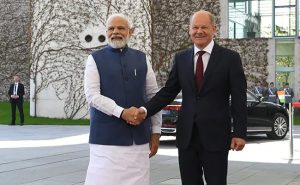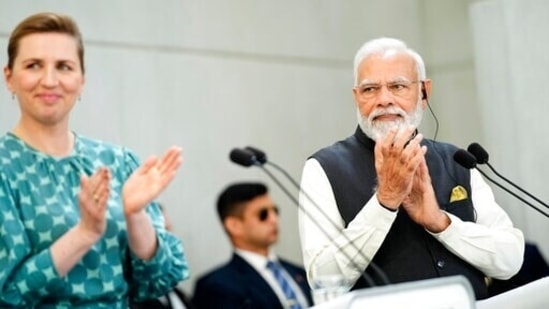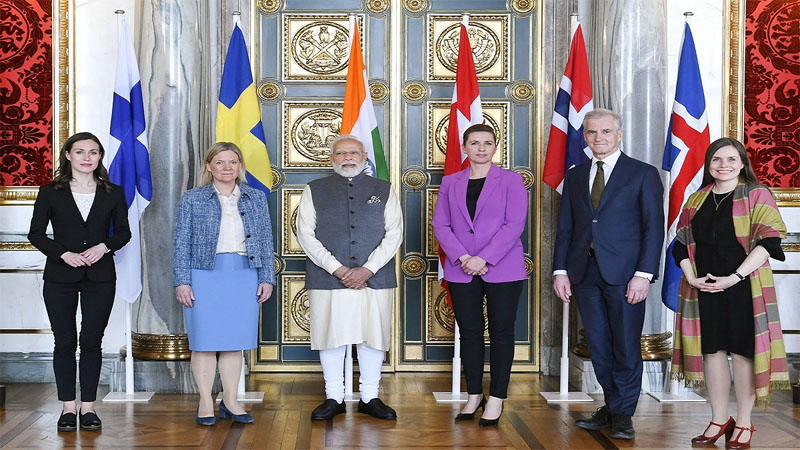PM Visits Germany, Denmark and France
Prime Minister Shri Narendra Modi visited Berlin, Germany on May 2, 2022 on the invitation of Mr. Olaf Scholz, Federal Chancellor of Germany, following which he traveled to Copenhagen, Denmark, from May 3-4, 2022, at the invitation of Prime Minister of Denmark Ms. Mette Frederiksen to hold bilateral engagements and also participated in the Second India-Nordic Summit. On the way back to India, he made a brief stopover in Paris, France, for a meeting with French President Mr. Emmanuel Macron.
PM’s Germany Visit
In Germany, one-to-one meeting between Prime Minister Shri Narendra Modi and Chancellor Mr. Scholz was held which was followed by the plenary session of the sixth inter-governmental consultations, which was then followed by a high-level business roundtable, which was attended both by Chancellor Mr. Scholz and Prime Minister Shri Modi and the leading executives of the business community from the two countries. It was followed by an address by Prime Minister Shri Modi to the Indian community.

Besides that, there have also been documents signed between the two countries. Several agreements were signed by both countries. The most important was the declaration of intent signed by both the leaders, Chancellor Mr. Scholz and Prime Minister Shri Modi, on green and sustainable development partnership. This declaration of intent imparts a long-term strategic perspective to the entire development cooperation agenda. Germany has agreed to make an advance commitment of 10 billion euros of new and additional development assistance until 2030.
The second is triangular development cooperation; essentially, India and Germany cooperate together in third-country projects. The third, an important one has done, is the declaration of intent, rather initialing of the text of the migration and Mobility Partnership Agreement. The fourth is the collaboration on green hydrogen and renewables, which Prime Minister Modi has prioritized, and as part of partnership in this space, a task force will work towards establishing a green hydrogen hub in India with German support.
The next one relates to defense cooperation in which the Indian and the German stakeholders would come together, both in the field of defense manufacturing, co-designing, and co-development and as part of discussions on global developments, the two leaders also shared their respective perspectives on developments on different issues developing all over the world. This included the knock-on effects of the Ukraine conflict, particularly in sectors like food, energy, fertilizers, and edible oil; these are all subject matter of discussion under the views on the global developments.
PM Visits Denmark

Prime Minister Shri Narendra Modi commenced the second leg of his program with his first visit to Denmark on May 3; as a special gesture, the Prime Minister of Denmark Ms. Mette Frederiksen, welcomed the Prime Minister at the airport. He started his program with a one to one talks with Prime Minister Mette Frederiksen, followed by delegation-level talks, in which the two Prime Ministers held extensive discussions on the full range of bilateral cooperation as also on matters of regional and global interest. In a high-profile business event, the two Prime Ministers also interacted with the top CEOs of both countries. During this interaction, Prime Minister Shri Modi invited the Danish businesses to associate with and invest in India’s economic growth story. 17 Danish CEOs and 13 Indian CEOs were present at this business event.
Outcomes would strengthen the green strategic partnership between the two countries, including through cooperation in green technologies, green hydrogen, renewables, green sustainable development solutions and fighting the climate change together
It was also clearly recognized at the event that India and Denmark and the private sector stakeholders need to highlight and project the success and strength of commercial partnerships between India and Denmark to the whole world. This was followed by an interaction with the Indian diaspora in Denmark, an event marked by great energy and enthusiasm. This event also was graced by Prime Minister Mette Frederiksen, who was present at this event. Bilateral discussions between the two leaders have also resulted in productive outcomes. Letter of intent was signed on smart water management on green shipping, and an announcement was also made about the launch of a ministerial energy dialogue between the two countries. These three outcomes would strengthen the green strategic partnership between the two countries, including through cooperation in green technologies, green hydrogen, renewables, green sustainable development solutions and fighting the climate change together. Outside the tropics, Denmark was the first country to join the International Solar Alliance.
Second, the discussions also led to the expansion of economic trade, investment, and digital and innovation cooperation between the two countries. This whole cluster is a very significant strand of partnership. Around 200 Danish companies are present in India, and around 60 Indian companies are present in Denmark. In this space, the outcomes included the Memorandum of Understanding on skill development, vocational education, and entrepreneurship. Also, joint declaration of the intent on the center of excellence on animal husbandry and dairying, three, Business and Technology Partnerships between the companies of India and Denmark across a range of sectors. And the two leaders also expressed their commitment to expedite the discussion and conclusion of the India-EU FTA. There were also discussions on bilateral cooperation in the Arctic region. And the outcomes also included an element that relates to people to people linkages. There was also a five-year cultural exchange program that was signed, which would strengthen the cultural cooperation between the two countries.
India -Nordic Summit
PM Shri Narendra Modi participated in the second India-Nordic Summit, which included the leaders of Finland, Sweden, Norway, Denmark, and Iceland. He held bilateral summit meetings with his counterparts from Sweden, Norway, Iceland, and Finland prior to the second Nordic Summit. Prime Minister’s Shri Modi’s visit has started a new chapter in India and Denmark green strategic partnership and sets an ambitious agenda of cooperation, which is mutually beneficial to both countries, economies, and societies.
PM’s Bilateral Meetings With Nordic Leaders
His meetings with four Nordic leaders started with his first meeting with his counterpart from Norway, where the principal focus of discussion and partnership was on: one, blue economy and its various facets, two, renewable energy, in particular cooperative possibilities in the field of hydroelectric and green hydrogen, three, the technology and investment ties. In this context, Prime Minister invited Norwegian pension funds to partner in India’s growth story. Fourth, in the health sector, in which the two leaders talked about cooperation relating to joint research in vaccines and the development of health infrastructure, and five, cooperation in building and restoring water bodies in India. They also talked about continuing cooperation and coordination in the UN Security Council and bilateral cultural cooperation, including in yoga between the two countries.
Prime Minister Shri Modi’s second meeting was with his counterpart from Sweden, where the principal focus of discussion and cooperation was: one on clean technology and sustainable solutions. This was discussed broadly under two rubrics, one relating to the investments by Sweden in India in clean technology and sustainable solution and two, partnerships in research and in innovation in this field, drawing on a successful partnership under the ‘LeadIT’ program, which is the program relating to industrial transition. The two leaders also spoke about S&T cooperation, including Polar research, and in terms of new areas, talked about the need to shape new partnerships in the field of space, arctic research, and defense.
His next meeting was with the Prime Minister of Iceland. This year, India and Iceland are celebrating the 50th anniversary of bilateral relations. Discussions between the two leaders focused on cooperation in the field of geothermal energy and its various aspects, including research, training, skill development, and innovation in this space. The two Prime Ministers also spoke about cooperation in the blue economy as also was with the previous two leaders, including in the field of fisheries and food processing. His next and last bilateral summit meeting was with the Prime Minister of Finland, where the focus of the conversation was to build on the existing strength which India and Finland have achieved in the entire ecosystem of digital partnership. More specifically, they talked about cooperation in the field of digital innovation, in the field of digital goods, and platforms, including infrastructure such as 5G and 6G. Both countries recently have established a Joint Center of Excellence in the field of quantum computing.
The two Prime Ministers also talked about women’s empowerment. And they also noted the upcoming completion of biorefinery project in Numaligarh in Assam. Thereafter the Prime Minister started the 2nd India-Nordic summit with the five Nordic Prime Ministers. Three clusters ran common to the Nordic summit’s entire discussions. One, was the need to combine the skill capabilities in Nordic countries with the scale of India, two, clean and green growth solutions, and three, to forge a new innovation partnership. The discussions during the Nordic Summit were held basically in three clusters, one, relating to multilateral cooperation in COVID aftermath, two, the climate and sustainable development and do economy, and three, the innovation segment. The first was that Prime Minister appreciated the Nordic countries as a very reliable partner in the last 75 years of India’s journey of growth and economic development. It was noted that Nordic countries in India have shared values of freedom and democracy and the rule-based order and also share perspectives on various global matters.
Under the segment of climate and sustainable development and blue economy, Prime Minister clearly outlined India’s commitment to sustainable clean, and green growth as reflected in Indian policies in this field on the ground. He also reiterated India’s five commitments which were made in COP 26, which is 500 gigawatts of non-fossil fuel by 2030, 50% of energy capacity to come from renewable energy by 2030, a reduction of 1 billion tonnes in projected carbon emissions by 2030, the carbon intensity of India’s economy to reduce by 45% by 2030 and net zero by 2070. The conversations also clearly brought out the need to focus on climate adaptation and climate resilience. In this context, Prime Minister also highlighted the need to strengthen partnerships with the two mechanisms which India has set up, which is one is CDRI and International Solar Alliance with Nordic countries. Prime Minister particularly emphasized the need to encourage people to change their lifestyles and promote what he has, often in publicly called lifestyle for the environment- LIFE. The Summit also talked about structuring a network of blue economy partnerships between India and Nordic countries.
In the last segment relating to innovation, which was a very strong area of the India-Nordic partnership, they focused on innovation. In this, the focus was particularly on healthcare innovation, and digital innovation, including, as I’ve already mentioned, when we spoke about discussions with Finland on digital goods and infrastructure, service innovation and technology partnerships.
PM’s France Visit

Prime Minister Shri Narendra Modi visited France on May 4. He met President Mr. Emmanuel Macron, congratulated him on being re-elected as the President of France, and held extensive discussions on a range of issues of bilateral, regional, and global importance. The Prime Minister last visited France in August 2019. The two leaders have stayed in regular touch through calls and letters. They also met on the sidelines of the G20 Summit last year.
India and France are strong strategic partners. President Macron renewed his mandate, and the conversations between Prime Minister Shri Modi and the President started building on the existing strengths and success of the India-France strategic partnership and jotting out a blueprint for its next phase. The two leaders held wide-ranging discussions on all the key areas of bilateral engagement, including defense, space, civil nuclear cooperation, and people-to-people linkages. They also discussed regional and global issues including developments in Europe and in the Indo-Pacific. India and France see each other as key partners in the Indo-Pacific.
On Ukraine, there was a broad understanding of each other’s position. The two leaders agreed that close coordination and engagement was important. So that both India and France can play a constructive role in the evolving situation. In sum it was a short yet, substantive visit. On the side-lines External affairs Minister, Dr. S. Jaishankar also met his French counterpart, Foreign Minister Jean-Yves Le Drian during the visit.


